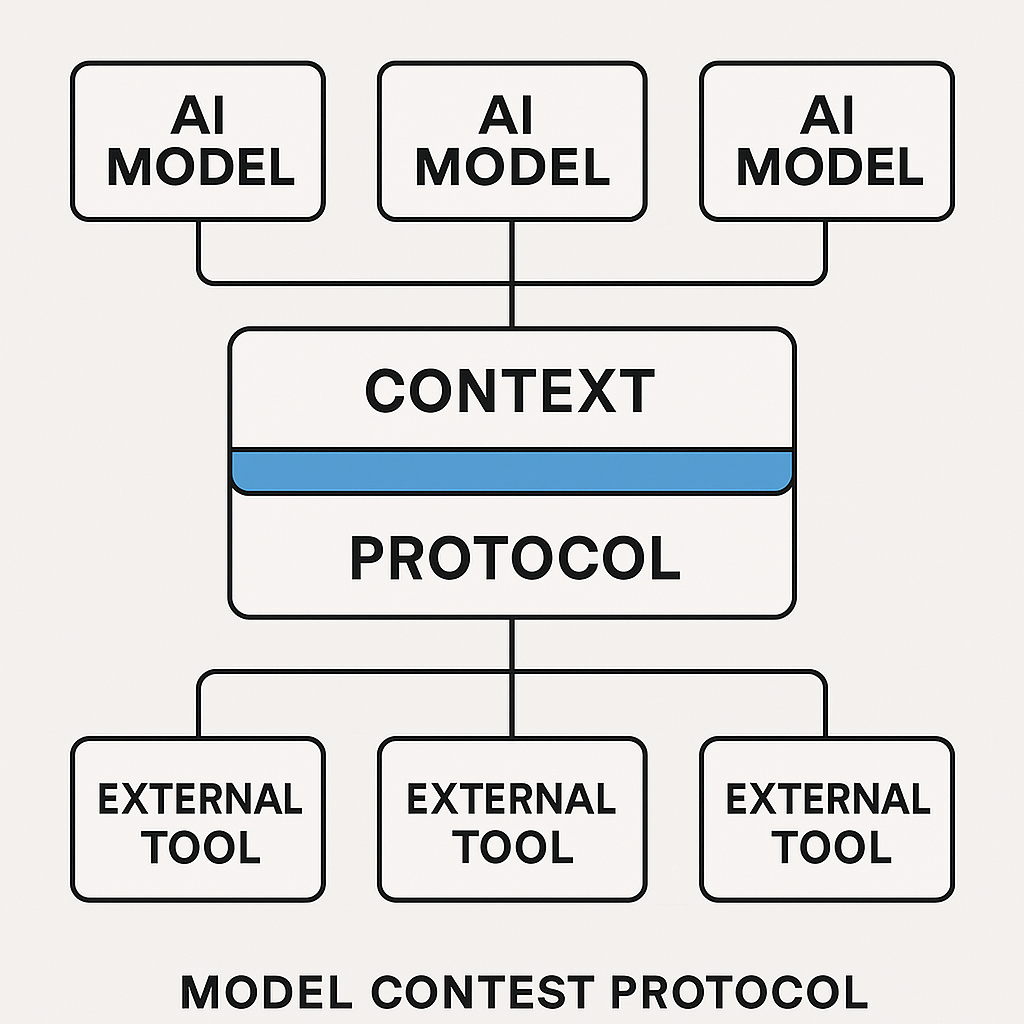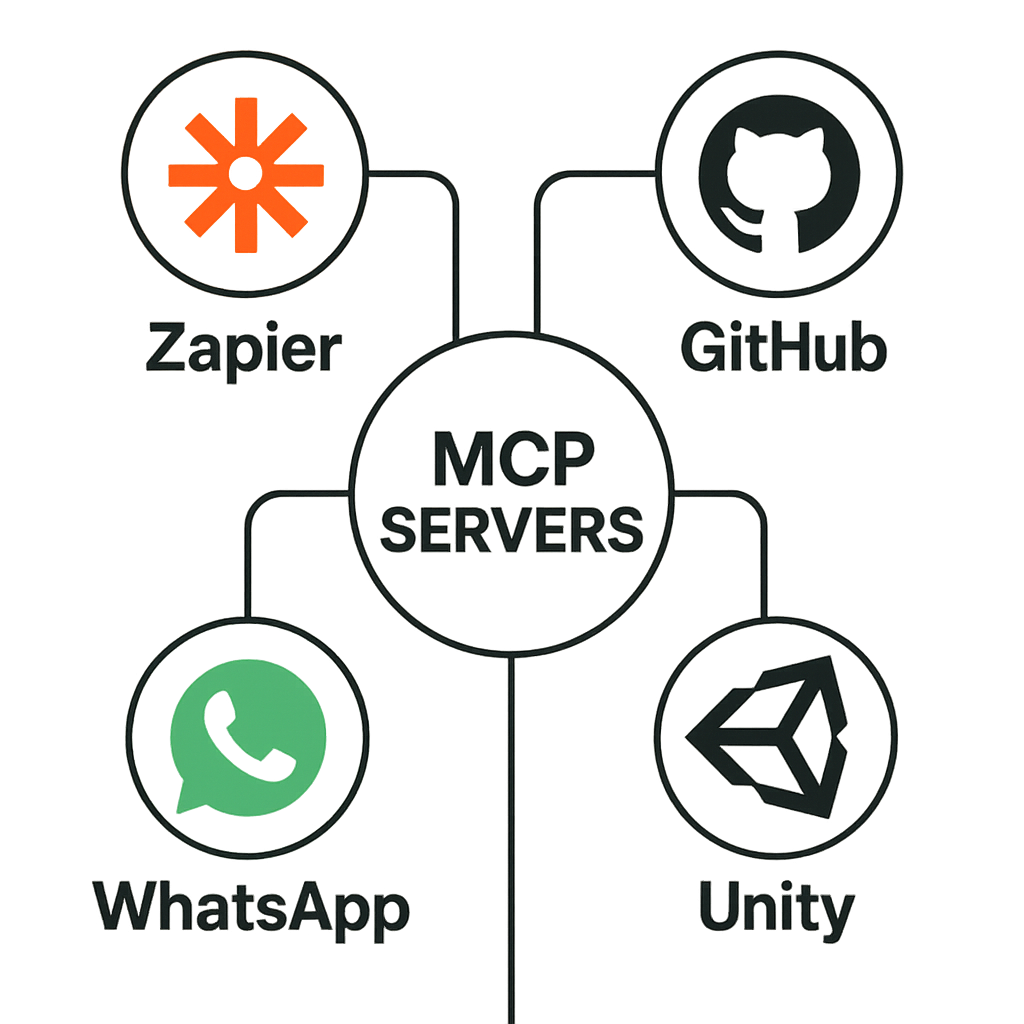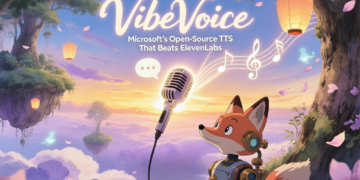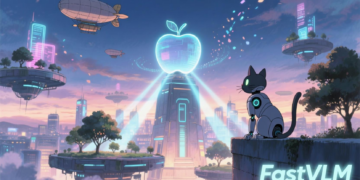Think of your AI assistant as a super-smart colleague who knows everything but can’t actually do anything in the real world. That’s where MCP (Model Context Protocol) servers come in – they’re like giving your AI assistant hands, eyes, and the ability to interact with all your favorite apps and tools.
MCP is essentially a universal translator that allows AI models like Claude to connect with external applications, databases, and services. Instead of your AI being limited to just answering questions, it can now perform real tasks like sending messages, managing files, automating workflows, and even helping you code.

Understanding MCP: The USB-C of AI Applications
The Model Context Protocol acts like a standardized connection system for AI applications. Just as USB-C allows you to connect various devices to your computer with a single port type, MCP provides a unified way for AI assistants to connect to thousands of different tools and services.
Before MCP, each AI application needed custom integrations for every external service it wanted to use. This created a fragmented ecosystem where developers had to build separate connections for each tool. MCP solves this by providing a single, open standard that any developer can use to create “servers” that bridge AI assistants with external capabilities.
My Top 5 Daily MCP Servers: Game-Changers for Productivity
After extensive testing and daily use, here are the five MCP servers that have completely transformed how I work with AI assistants:
1. Zapier MCP: The Ultimate Automation Hub
Zapier MCP is hands down the most powerful productivity tool in my arsenal. Instead of manually switching between apps all day, I can now ask Claude to automate workflows across more than 7,000 applications.
What makes this extraordinary is the sheer scope of possibilities. I can ask Claude to “create a new task in Asana when someone mentions our project in Slack, then send a summary email to the team”. The AI doesn’t just understand what I want – it actually executes the entire workflow through Zapier’s massive ecosystem.
Setting up Zapier MCP requires getting a personal MCP endpoint URL from your Zapier account. This URL acts as a secure gateway between Claude and your Zapier automations. The beauty is that you configure your allowed actions once, and then Claude can execute them through natural language commands.
2. WhatsApp MCP: Taming Message Overload
Anyone who’s part of active WhatsApp groups knows the struggle of catching up on hundreds of messages. WhatsApp MCP solves this by allowing Claude to access and analyze your chat conversations.
I can simply ask “summarize what happened in the family group today” and get a clean, organized summary instead of scrolling through endless messages. The server can process over 1,000 messages at once, identifying key topics, important announcements, and even action items that need your attention. It’s like having a personal assistant who reads all your messages and gives you the highlights.
3. Unity MCP: AI-Powered Game Development
Unity MCP represents the future of creative coding. This server connects Claude directly to the Unity game engine, enabling what developers call “vibe coding” – where you describe what you want to create, and the AI generates the actual 3D assets and code.
Instead of spending hours learning complex Unity workflows, I can tell Claude “create a simple platformer character that can jump and collect coins”. The AI then generates the necessary GameObjects, scripts, and even basic animations. It’s democratizing game development by removing the technical barriers that prevent creative people from bringing their ideas to life.
4. Reddit MCP: Mining Opportunities from Social Media
The Reddit MCP server transforms how I discover freelancing and business opportunities. Rather than manually browsing through countless subreddits, I can ask Claude to “find recent posts about Python development opportunities in r/forhire”.
The server can analyze post content, comments, and even track trending discussions across multiple subreddits simultaneously. It’s like having a research assistant who’s constantly monitoring social media for relevant opportunities and presents them in an organized, actionable format.
5. Twitter MCP: Social Media Intelligence
Similar to Reddit MCP, the Twitter server helps me stay on top of opportunities and industry trends without getting lost in the endless scroll. I can ask Claude to “find tweets from the last 24 hours about AI freelancing opportunities” and get a curated list with relevant context.
The server supports posting tweets, searching content, managing accounts, and organizing lists. This means I can use Claude to not just monitor Twitter but also engage strategically with my professional network.

Technical MCP Servers: Tools for Developers and Power Users
Beyond daily productivity, there’s an entire ecosystem of technical MCP servers designed for developers, researchers, and advanced users. These tools showcase the true potential of connecting AI to specialized software and databases.
Development and Code Management
GitHub MCP Server provides complete integration with GitHub’s API, allowing Claude to manage repositories, create pull requests, handle issues, and even analyze code changes. Developers can ask their AI assistant to “create a new branch, implement the login feature, and open a pull request” – all through natural language.
Safe Local Python Executor addresses a critical need for secure code execution. Instead of running AI-generated code directly on your system (which could be dangerous), this server uses Hugging Face’s LocalPythonExecutor to provide a sandboxed environment. It restricts file operations and limits imports to safe libraries like math, datetime, and statistics.
Cursor MCP Installer streamlines the process of adding MCP servers to the popular Cursor IDE. Rather than manually configuring each server, you can ask Claude to install and configure new MCP servers automatically.
Knowledge and Data Processing
Notion MCP Server transforms how you interact with your Notion workspace. You can ask Claude to create pages, update databases, search for information, and even manage complex project structures. The latest version includes full database functionality, allowing you to create custom properties and views through AI commands.
Basic Memory creates a persistent knowledge base from your AI conversations. Unlike typical chat sessions that forget everything when you close them, Basic Memory stores insights as Markdown files on your computer. Your AI assistant can then reference previous conversations and build upon past knowledge.
arXiv MCP connects Claude to the world’s largest repository of scientific papers. Researchers can ask their AI assistant to “find recent papers about transformer architectures” and get summaries, abstracts, and direct links to relevant publications. The server implements proper rate limiting to respect arXiv’s API guidelines.
System and File Operations
Filesystem MCP Server provides controlled access to your computer’s file system. You can ask Claude to read files, create directories, search for documents, and even organize your file structure. Security features ensure that access is limited to designated folders.
Mobile Next MCP Server enables AI control of mobile applications across iOS and Android. This groundbreaking server allows Claude to interact with mobile apps through either accessibility data or screenshot analysis. You could ask your AI to “open the weather app, check tomorrow’s forecast for Berlin, and send the summary via WhatsApp to Lauren”.
Fetch MCP Server handles web scraping and content conversion. It can fetch websites as HTML, convert them to Markdown, retrieve JSON data, or extract plain text. This is invaluable for research tasks where you need to process multiple web sources quickly.
| Server Name | Category | Primary Use Case | Key Feature | Installation | User Priority |
|---|---|---|---|---|---|
| Zapier MCP | Productivity & Automation | Connect 1000+ apps to Claude (automate workflows across tools) | Massive app ecosystem integration | Via Zapier account setup with MCP endpoint | Top 1 |
| WhatsApp MCP | Productivity & Automation | Summarize group chats (1000+ messages) | Message processing/analysis | GitHub: msaelices/whatsapp-mcp-server | Top 2 |
| Unity MCP | Development & Code | Game development via ‘vibe coding’ (generate 3D assets/code from prompts) | AI-powered Unity automation | GitHub: justinpbarnett/unity-mcp | Top 3 |
| Reddit MCP | Productivity & Automation | Find freelancing opportunities (scrape latest posts) | Opportunity discovery on social platforms | GitHub: awstein/mcp-server-reddit | Top 4 |
| Twitter MCP | Productivity & Automation | Find freelancing opportunities (scrape latest posts) | Opportunity discovery on social platforms | GitHub: Dishant27/twitter-mcp | Top 5 |
| Agentset MCP | Data & Knowledge | Build document-based RAG apps | Retrieval-Augmented Generation platform | GitHub: agentset-ai/mcp-server | Technical |
| GitHub MCP Server | Development & Code | Integrate with GitHub API (manage repos, issues, actions) | Complete GitHub workflow automation | GitHub: github/github-mcp-server | Technical |
| Cursor MCP Installer | System & Utilities | Auto-add MCP servers to Cursor IDE | Streamlined Cursor integration | GitHub: matthewdcage/cursor-mcp-installer | Technical |
| Notion MCP Server | Data & Knowledge | Manage Notion workspaces (pages, databases) | Full database functionality | GitHub: makenotion/notion-mcp-server | Technical |
| MCP Run Python | Development & Code | Sandboxed Python execution via Pyodide/Deno | Safe Python execution in browser | GitHub: pydantic-ai/mcp-run-python | Technical |
| Safe Local Python Executor | Development & Code | Securely run LLM-generated Python locally | Restricted imports and no file I/O | GitHub: maxim-saplin/mcp_safe_local_python_executor | Technical |
| arXiv MCP | Data & Knowledge | Search/analyze arXiv scientific papers | Academic research integration | GitHub: andybrandt/mcp-simple-arxiv | Technical |
| Basic Memory | Data & Knowledge | Build semantic knowledge graphs from AI conversations | Persistent memory in Markdown files | Docs: memory.basicmachines.co | Technical |
| Markdownify MCP Server | Data & Knowledge | Convert PDFs/images/audio/web pages → Markdown | Universal content conversion | GitHub: zcaceres/markdownify-mcp | Technical |
| Fetch MCP Server | System & Utilities | Web scraping + HTML-to-Markdown conversion | Multiple format web content fetching | GitHub: modelcontextprotocol/servers/src/fetch | Technical |
| Filesystem MCP Server | System & Utilities | File/directory management (read/write/delete) | Complete local file system access | GitHub: modelcontextprotocol/servers/src/filesystem | Technical |
| Mobile Next MCP Server | System & Utilities | Mobile app automation (UI recognition, click automation) | Cross-platform mobile automation | GitHub: mobile-next/mobile-mcp | Technical |
| MCP Installer | System & Utilities | Auto-install MCP servers from npm/PyPI via LLM requests | Automated server installation | GitHub: anaisbetts/mcp-installer | Technical |
Getting Started: Your First Steps into the MCP World
Setting up MCP servers might seem intimidating, but it’s actually quite straightforward. Most MCP-compatible applications like Claude Desktop have built-in support that requires only basic configuration.
The process typically involves editing a configuration file where you specify which servers to load and any required credentials. For example, Claude Desktop uses a JSON configuration file where you list your desired MCP servers along with installation commands.
MCP Servers Setup Guide for Beginners
What Are MCP Servers?
Think of MCP (Model Context Protocol) servers as digital bridges that connect your AI assistant (like Claude or Cursor) to the real world. Just like a USB port lets you plug different devices into your computer, MCP servers let your AI connect to different apps, websites, and tools.
How Do They Work?
- You ask your AI to do something (like “Send a message on WhatsApp”)
- The AI uses an MCP server to actually perform that action
- The MCP server talks to the external service (WhatsApp in this case)
- You get the result back through your AI assistant
Getting Started with Claude Desktop
Step 1: Find Your Configuration File
On Mac:
- Open Finder
- Press
Cmd + Shift + G - Type:
~/Library/Application Support/Claude/ - Look for
claude_desktop_config.json
On Windows:
- Press
Windows + R - Type:
%APPDATA%\Claude\ - Look for
claude_desktop_config.json
Step 2: Edit the Configuration
Open the file with any text editor and add your MCP servers like this:
{ "mcpServers": { "server-name": { "command": "installation-command", "args": ["arguments"], "env": { "API_KEY": "your-api-key-here" } } }}Popular MCP Servers to Try
1. Zapier MCP (Connect 1000+ Apps)
"zapier": { "command": "npx", "args": ["-y", "mcp-remote", "your-zapier-mcp-url-here"]}2. GitHub MCP (Manage Code Repositories)
"github": { "command": "docker", "args": ["run", "-i", "--rm", "-e", "GITHUB_PERSONAL_ACCESS_TOKEN", "ghcr.io/github/github-mcp-server"], "env": { "GITHUB_PERSONAL_ACCESS_TOKEN": "your-github-token" }}3. Filesystem MCP (Manage Files)
"filesystem": { "command": "npx", "args": ["-y", "@modelcontextprotocol/server-filesystem", "/allowed/path"]}Safety Tips
⚠️ Important Security Notes:
- Never share your API keys with anyone
- Only install MCP servers from trusted sources
- Be careful with file system access – only allow access to folders you trust
- Review what each server can do before installing it
Troubleshooting
Common Issues:
“Server not found”
- Check that you’ve restarted Claude Desktop after editing the config
- Verify the server installation command is correct
“Permission denied”
- Make sure you have the required API keys
- Check that the server has proper permissions
“Server crashed”
- Look for typos in your configuration file
- Ensure all required dependencies are installed
What Can You Do With MCP Servers?
Daily Productivity:
- Zapier: Automate tasks across 1000+ apps
- Notion: Manage your workspace and databases
- WhatsApp: Summarize long chat conversations
Development Work:
- GitHub: Manage repositories and issues
- Unity: Generate game assets and code
- Python Executor: Run code safely
Research & Learning:
- arXiv: Search scientific papers
- Basic Memory: Build a knowledge base
- Web Fetch: Scrape and convert web content
Next Steps
- Start small – Try one simple server like Filesystem MCP
- Learn gradually – Add more servers as you get comfortable
- Join communities – Follow MCP discussions on GitHub and Reddit
- Experiment – Try combining multiple servers for powerful workflows
Getting Help
- Official MCP Documentation: https://modelcontextprotocol.io/
- GitHub Issues: Check individual server repositories
- Community Forums: Reddit r/ClaudeAI and GitHub Discussions
Remember: MCP is still new and evolving rapidly. New servers are being created all the time, so keep exploring!
Security is paramount when working with MCP servers. Never share API keys publicly, only install servers from trusted sources, and carefully review what permissions each server requires. Start with simple, low-risk servers like the Filesystem MCP (with restricted folder access) before moving to more powerful tools.
Real-World Applications: Transforming Daily Workflows
The true power of MCP servers emerges when you combine multiple servers for complex workflows. For instance, you might use Fetch MCP to scrape industry news, Markdownify MCP to convert it to a readable format, and Notion MCP to store insights in your knowledge base.
Content creators can use Reddit MCP to identify trending topics, arXiv MCP to research background information, and GitHub MCP to manage their project documentation. This creates an AI-powered research and creation pipeline that would have required hours of manual work.
Developers can combine Unity MCP for asset creation, GitHub MCP for version control, and Safe Python Executor for testing code snippets. The AI assistant becomes a comprehensive development partner that understands your entire workflow.
The Future of AI-Human Collaboration
MCP servers represent a fundamental shift in how we interact with AI. Instead of AI being limited to answering questions, we’re moving toward AI that can actually perform tasks in our digital environment. This bridges the gap between AI’s reasoning capabilities and real-world applications.
The ecosystem is rapidly expanding, with new servers being developed for everything from database management to creative tools. As more developers adopt the MCP standard, we can expect an explosion of specialized servers that connect AI to virtually every digital tool we use.
Conclusion: Embracing the MCP Revolution
MCP servers are not just another tech trend – they’re a fundamental evolution in human-AI collaboration. By connecting AI assistants to real-world tools and data, we’re creating a new paradigm where AI becomes a true digital partner rather than just an advanced search engine.
Whether you’re a business professional looking to automate workflows, a developer seeking to enhance your coding environment, or a researcher needing to process vast amounts of information, MCP servers offer unprecedented opportunities to augment your capabilities. The key is starting small, learning gradually, and building confidence with simple servers before exploring more advanced applications.
The future of productivity lies not in replacing human creativity and judgment, but in eliminating the tedious, repetitive tasks that prevent us from focusing on what truly matters. MCP servers are the bridge to that future, and they’re available today for anyone willing to explore their potential.


















